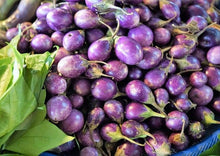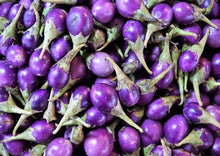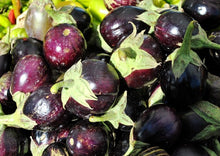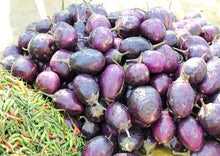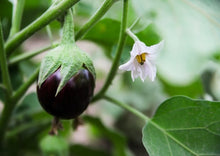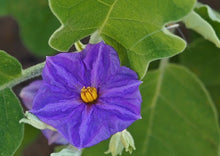
ur Heirloom Organically Grown Thai Purple Baby Eggplant is carefully cultivated on small family farms. The eggplant originated from Thailand, warm and humid climate combined with its fertile soil, creates the ideal growing conditions for this unique variety of eggplant. The farmers who grow our eggplants have passed down their traditional farming methods for generations, ensuring that each eggplant is grown with care and attention to detail.
Our Thai Purple Baby Eggplants are grown using only the highest quality organic methods. This means that they are never treated with any harmful chemicals or pesticides, and are non-GMO. This ensures that our eggplants are not only delicious, but also safe and healthy for you and your family to eat.
The farmers who grow our eggplants are dedicated to preserving the heirloom variety of Thai Purple Baby Eggplant. This means that they do not use any modern hybridization techniques, and instead rely on traditional methods to ensure that each eggplant is true to its unique and flavorful heritage.
In addition to its delicious taste, our Heirloom Organically Grown Thai Purple Baby Eggplant is also known for its beautiful deep purple color. This color is a result of the high levels of anthocyanin, a powerful antioxidant, found in the eggplant's skin. This not only adds an eye-catching visual element to dishes, but also provides added health benefits.
When you choose our Heirloom Organically Grown Thai Purple Baby Eggplant, you are not only getting a delicious and unique ingredient, but also supporting small family farmers and preserving traditional farming methods. Enjoy the taste of authenticity in every bite.
Growing
Eggplant – also known as Brinjal grows wild in its homeland of South Asia as a perennial plant, though these warm-season vegetables are treated by most gardeners as annuals. Given their tropical and subtropical heritage, eggplants do require relatively high temperatures, similar to tomatoes and peppers (Nightshade family). They grow fastest when temperatures are between 70 and 85°F and very slowly during cooler weather. Like tomatoes and peppers, eggplants develop and hang from the branches of a plant that grows several feet in height. Because they need warm soil, eggplants are usually started indoors about two months in advance to get a head start. Raised beds enriched with composted manure are an ideal growing place for eggplants because the soil warms more quickly.
Planting
- Start seeds indoors about 8–9 weeks prior to your last spring frost date, seeds germinate quickly at temperatures between 70 to 90°F.
- Do not plant eggplant transplants into the garden until after the last threat of frost.
- Choose a very sunny spot for the best results.
- Gutti vankaya / kateri grows best in a well-drained sandy loam or loam soil, fairly high in organic matter.
- Use mulch to warm soils before setting out transplants.
- Brinjal / Eggplant requires moderate amounts of fertilizer. Mix about 1” of well-rotted manure or a general fertilizer about a week before planting.
- If growing in pots, use at least 5-gallon pot per plant. Place it outdoor in full sun so it can be pollinated. Use premium soil mix to avoid disease.
- Stake the plants right away (just an inch or two from the plant) to provide support as they climb and to avoid disturbing the soil later.
- If you live in a cold climate, consider using row covers to keep the eggplants warm and sheltered. Open the ends of the row covers on warm days so that bees may pollinate.
- After planting, water well. Add a layer of mulch to retain moisture and suppress weeds
- Eggplant will fall over once loaded with fruit! Be sure to stake tall plants or use a cage to keep the plants upright.
- Pinch out the terminal growing points for a bushier plant. For bigger fruits, restrict to five or six per plant.
- Water well to moisten the soil to a depth of at least 6 inches so the soil is moist but never soggy.
- The critical period for moisture is during fruit set and fruit development. Mulching can help to provide uniform moisture & conserve water.
- Apply a balanced fertilizer twice during the growing season. Side-dress when the first fruits are about the size of a quarter. Note:Too much nitrogen may cause excessive vegetative growth.
Pests / Diseases
- Flea beetlesare probably the most common pest, but a healthy eggplant should be able to withstand damage from their tiny holes. Damage is usually serious only on young seedlings. Grow plants under row covers until they are large enough to tolerate leaf damage.
- Powdery Mildew can affect eggplant. This appears as white, powdery spots on the leaves which may turn yellow and die. The best method of control is prevention. Plant where it receives full sun, and provide good air circulation. Water at the soil level, not on the leaves.
- Tomato Hornworms are sometimes an issue as are Colorado potato beetles, lace bugs, and mites.
- If the flowers on eggplants form but then fall off, or if fruit does not develop, the most likely problem is that the temperature is too cold.
- If the fruits are small and not growing, it’s also probably too cold. Eggplants like it hot! Daytime temperatures need to be 80° to 90° F and night time temperatures should not go below 60° to 65° F or their grow is very slow to stalled.
Click here to download our free vegetable growing guide

Heirloom, Organically Grown, Thai Purple, Baby Eggplant, Anthocyanin, Non-GMO, Family Farms, Culinary, Antioxidant, Tender Flesh, Unique Variety, Rich Flavor, Healthy; Indian vegetable seeds; Best indian vegetable seeds in USA; Top vegetable seeds for USA climate; Organic vegetable seeds India; High yield vegetable seeds India; Popular vegetable seeds in India, Heirloom Indian vegetable seeds USA; Vegetable seeds for home gardening USA; Traditional Indian vegetable seeds; Non-GMO vegetable seeds USA; Vegetable seeds for balcony gardening India; High-quality indian vegetable seeds USA; Vegetable seeds for urban farming USA; Seed companies in India; Best vegetable seeds for Indian kitchen garden; Fast-growing vegetable seeds India; Vegetable seeds for all seasons India; Best vegetable seeds for hydroponic gardening India; Vegetable seeds for beginner gardeners India and USA; Rare vegetable seeds India; Affordable vegetable seeds India; Imported vegetable seeds India; Native Indian vegetable seeds; Open-pollinated vegetable seeds India.






